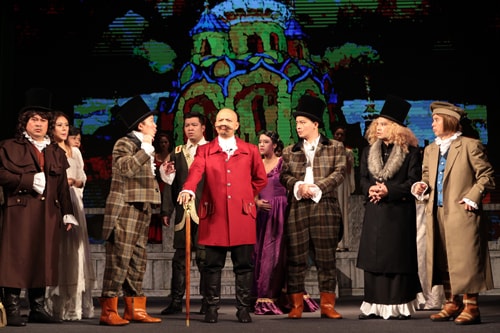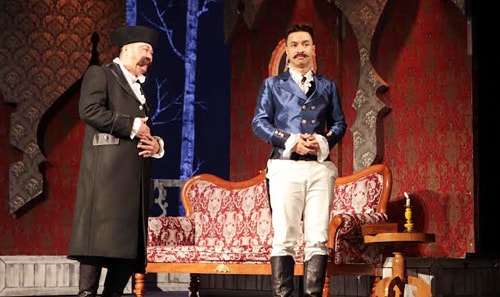Wrongful imprisonment, corruption, the idea of removing History subject from the theater stage
Artists from the Youth Theater turned the nearly 200-year-old script "Inspector" into a work with a contemporary feel and many topical details.
With the desire to introduce one of the 100 classic works of world theater, the Youth Theater chose to stage The Inspector General. The script was written by writer Nikolai Gogol in 1835 with a sarcastic, satirical tone. The main character is a small official who runs out of money and wanders into a town. The local officials mistake him for an inspector from the capital Petersburg on an inspection tour. Being corrupt, the officials are afraid and try to bribe the "big man". On that occasion, they denounce each other and speak ill of each other to flatter their own achievements. The mayor plans to take advantage of his wife and daughter to climb higher on the ladder of fame.
 |
| Image of local officials plotting against the Inspector in the play. |
When staging the play, the artists encountered difficulties because the play was nearly 200 years old, and the social context was far back in history. To bring freshness, the director included current events. In one scene, the Inspector came to bribe the Inspector. After the Inspector received the money, the Inspector in charge of education was sure: "He probably won't go to school anymore. I've decided to drop History. That's it."
In another scene, the Chief Justice came to bribe the Inspector. He flattered: "Of course, I will use all my humble talents, my humble strength, and my zeal and enthusiasm to be worthy of my superiors." To show his loyalty, this person declared: "Do you need to sentence someone right away? I am willing to sentence them to 10, 15, or even 20 years in prison. Don't worry, even if you wrongly sentence them to 17 years, I only need to apologize for nearly 30 minutes and it will be over."
The two details of "removing History" and "wrongful conviction" both evoke associations with major issues that have occurred recently. The detail of "removing History" is similar to the draft of the general education program of the Ministry of Education and Training. This draft proposes to integrate History with Civic Education and National Security into a new subject called Citizenship and Fatherland. The draft received opposition from scholars and the general public. Many opinions say that History plays an important role, integrating it with another subject means "killing" History, and it is unknown what the outcome will be.
The detail of “wrongful imprisonment” evokes the recent wrongful conviction cases. In which, Mr. Huynh Van Nen had to spend 17 years and 5 months in prison. And Mr. Nguyen Thanh Chan in Bac Giang also lost 10 years unjustly.
 |
| The inspector (in blue shirt) is actually a low-ranking civil servant. |
In addition, the play touches on many hot social issues. The fact that officials try to keep their positions is exaggerated in the Chief Justice's testimony: "I was elected to a three-year term. But after 21 years, I still continue to hold the position." The habit of chasing achievements is shown in the way the person in charge of health care handles things. When he heard that the Inspector was coming, the head of the hospital sent most of the patients home to avoid overload and maintain temporary cleanliness...
The play Quan thanh tra was directed by artist Chi Trung, with the participation of Anh Tuan, Van Dung, Chi Huy, Ngoc Huyen, Quanh Anh... Dang Huu Phuc was in charge of the music with Russian melodies. The dance in the work was choreographed by Lam Yen - an artist who studied dance in Russia for seven years. Artist Doan Bang created the stage and costumes, creating a space imbued with Russian culture. The work was performed after the Binh Than New Year.
According to Vnexpress
| RELATED NEWS |
|---|








